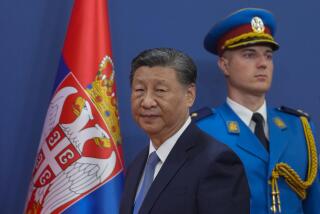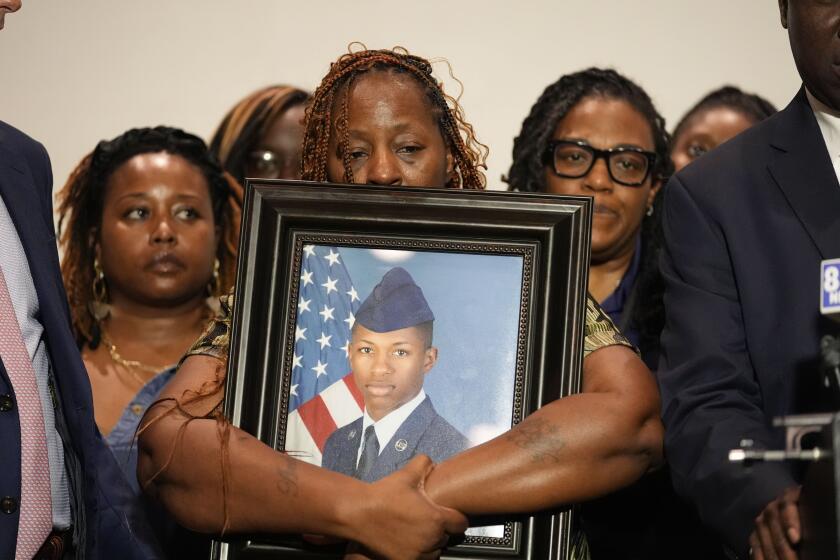Are Soldiers to Blame for Abuses? Or Are They Just Following Orders? : Israel: Budding controversies over the strategy in occupied areas are pulling a bitter debate into the open.
Military abuse against Palestinians and the response of Israeli authorities to such cases are fueling a bitter debate in Israel: Are individual soldiers to blame, or is it the fault of the orders they are given?
Two budding controversies are pulling the debate into the open. In one, a military wife is campaigning to avert a trial of her husband for ordering troops to beat Palestinian detainees. She argues that government officials, specifically Defense Minister Yitzhak Rabin, were ultimately responsible.
In the other, a recent report by Amnesty International, the London-based human rights monitor, charged that the liberalization of rules governing troops’ use of gunfire amounts to “more than just tolerance of serious abuses” and is in fact “a real encouragement of them.”
“We don’t pretend the situation is snow-white,” said Brig. Gen. Amnon Straschnov, the army’s advocate general. “We ask for understanding of the difficulties of a complex situation.”
The controversies have implications both for army morale and for the question of how best to settle the 25-month-old Arab uprising against Israeli rule in the occupied West Bank and Gaza Strip.
The Israel Defense Forces considers its role in policing the uprising to be a restrained one and says abuses are exceptions rather than the rule. But this is not to say that stern measures lack sanction. The uprising is officially defined as an extension of Arab hostility dating back to the founding of the nation. If the existence of Israel is at stake, then what in fact are the limits of suppression?
Meanwhile, diplomatic efforts to begin peace talks are all but deadlocked. High-ranking army officers, including the chief of staff, Lt. Gen. Dan Shomron, have repeatedly warned that the uprising cannot be smashed by military means. Nevertheless, with no political solution in sight, is the burden on the army to try to end the unrest by any means possible?
While the army is far from cracking under the strain, there are signs of increasing discontent. About 75 soldiers have openly refused to serve in the West Bank and Gaza and have been sentenced to short jail terms, according to Straschnov. That is half the number who refused to serve in Lebanon during the unpopular three-year war that ended in 1985.
Beyond open refusal, there is a growing tendency of soldiers to avoid going to the occupied lands through “gray resistance”--calling in sick, pleading mental illness, seeking out alternative duty on Israel’s borders or getting other duty as a favor from friendly officers.
“Most soldiers do not like the job they are doing,” Straschnov said. “This is not fighting or training, but crowd control. If they prefer to serve in Lebanon or the Golan Heights, that speaks in favor of their morale and morality. No one likes to go on midnight searches and seizures.”
The changeability of their orders appears to be complicating the willingness of rank-and-file soldiers to serve in Gaza and the West Bank. “People are upset because they are trained to follow orders and later can get in trouble for it,” said Orna Meir, the military wife who is campaigning on behalf of her husband, Col. Yehuda Meir.
Last month, Israel’s Supreme Court ruled that Col. Meir must stand trial on charges that he commanded troops to break the bones of Palestinians rounded up in the villages of Beita and Hewara in January, 1988, one month into the Arab uprising. Meir has declined to be interviewed pending the court-martial.
Originally, Straschnov, the advocate general, decided not to prosecute Meir, who is a veteran of the Lebanon war. The colonel was reprimanded in May and permitted to take leave without pay until retirement in 1992. But an Israeli civil rights group sued, calling the punishment too lenient. In a controversial decision, the high court concurred.
Meir was indicted on eight counts, including torture, intentionally causing bodily harm, assault in grievous circumstances and unbecoming conduct.
In the Hewara incident, 12 Palestinians were beaten until their bones broke. The sticks used by some of the soldiers broke as well. Eight Palestinians in Beita were similarly beaten.
Meir was quoted by the Jerusalem Post as saying: “I have no doubt that the matter will be cleared up in the trial. I’m sorry, though, that I have to fight the institution (the army) to which I gave the best years of my life.”
Orna Meir contends that her husband was following clear orders and that the official responsible for the orders was Defense Minister Rabin. A few days before the beatings, Rabin had declared that “force, power and blows” would be a prime method of deterring stone-throwers in the West Bank and Gaza.
“My husband did what he was told to do. Then, later, the authorities decided it was not proper,” Orna Meir said in an interview at her home in Oranit, a small settlement on the rim of the West Bank near Tel Aviv.
“He is being made a scapegoat,” she said. “If what he did was not legal, then those who gave the order should pay. I say it is the minister of defense.”
Orna Meir claims to represent a growing number of military families who are ill at ease with legal proceedings against full-time and reserve soldiers.
Gen. Straschnov defended his original treatment of Col. Meir, asserting that in the early days of the intifada, or Arab uprising, orders were unclear. “Since that time, the rules of engagement have been made clear enough.”
As for the high court ruling, Straschnov added: “I make hundreds of decisions every day (on military actions). “If the justices say that I am mistaken in one decision, that shows the supremacy of the rule of law.”
But current orders are also on trial among human rights critics. The Amnesty International charges, which were released Jan. 3, responded sharply to reports that soldiers and undercover agents are authorized to fire on fleeing protesters, masked males and suspects wanted for violent activity.
“Existing guidelines for the use of firearms as well as the pattern of killings and the subsequent investigations suggest that Israeli authorities are effectively condoning, perhaps even encouraging, extra-judicial executions as a means of controlling the unrest,” the report said.
During a recent lecture, Martin Van Crefeld, a lecturer in military history at Hebrew University, heaped abuse on Chief of Staff Shomron for “abandoning the soldiers in the territories to their own devices . . . betraying them by sending them into action with orders that are impossible to obey and then letting soldiers take the rap.”
The professor’s comments followed by a few days a lecture at the Hebrew University Law School by Uri Shoham, a colonel and head of the military appeals court in the West Bank, who explained that the army could not function if soldiers were to question every order given them. On the other hand, he said, soldiers are expected to refuse to obey orders they think are “patently illegal.”
Although most killings in the uprising take place during demonstrations or riots, Amnesty International concluded that “an alarmingly high number” of shooting incidents occurred during events that were neither life-threatening nor violent. The human rights organization singled out for particular condemnation the shooting of men and youths wearing masks.
Straschnov said that rules governing the firing of weapons have been broadened only as a means of catching suspects or Palestinians wearing masks and that the changes are justified by Palestinian crimes against fellow Arabs.
“I don’t agree with the report at all. It’s very easy to say what is wrong,” he declared. “It’s more difficult to have responsibility to provide security on the one hand and the responsibility for the rights of the population on the other.”
Masked men and youths are shot at--regulations say this is allowed only after verbal warnings, a warning shot in the air and then bullets aimed below the waist--because they are considered the most violent of intifada activists, Straschnov said. They are viewed as responsible for killing at least 130 Arabs in the Palestinian campaign against suspected collaborators.
“We say that the masked people in the street are not innocent,” the advocate general said. “This is not Halloween. They still have the opportunity, when told to stop, of giving themselves up to authority. If they run away, they are in trouble.”
He added: “We don’t have to wait until the next day to find bodies of dead Arab victims” of execution by masked men.
About 600 Palestinians have been killed by Israeli soldiers. Palestinians have killed about 40 Israelis. Ninety-one soldiers have been charged with abuses, including 30 for cases of shooting or beating deaths. Four were given prison terms; the maximum sentence was two years.
On Jan. 13, the army suspended two border policemen on charges that they violated orders in the shooting death of a Bethlehem rock thrower last month. Military officials said the pair gave a false report of the shooting, saying that demonstrators carried axes and ignored shouted orders to halt.
A videotape of the incident showed that one of the police opened fire without warning. Witnesses said no verbal orders to halt were given.
More to Read
Start your day right
Sign up for Essential California for news, features and recommendations from the L.A. Times and beyond in your inbox six days a week.
You may occasionally receive promotional content from the Los Angeles Times.






